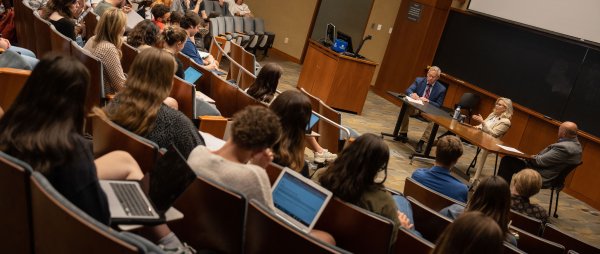
Democracy Labs and Working Groups form the academic foundation of the Karsh Institute and create a venue for faculty from across the University of Virginia to team up with posdoctoral scholars, practitioners, and graduate and undergraduate students to delve into specific and timely democracy-related topics.
The Lab and Working Group models allow the Karsh Institute to adapt its areas of focus and support research, teaching, and public outreach to address contemporary (and ever-evolving) challenges to democracy.
Current Labs
The John L. Nau III History & Principles of Democracy Lab
As the core lab within UVA’s Karsh Institute of Democracy, the John L. Nau III History & Principles of Democracy Lab focuses on conceptual and historical questions of democracy. It offers a yearly transdisciplinary graduate course on democracy that is open to students from all fields. The Nau Lab is the hub of the Karsh Institute’s docket of rotating labs, projects, and programming focused on the history and principles of democracy. READ MORE
Digital Technology for Democracy Lab
The Karsh Institute’s Digital Technology for Democracy Lab is a UVA-wide collaboration that explores the intersections of democracy and digital technology, including how rapidly evolving digital technologies can challenge but also fortify democratic institutions and practices. Funded by UVA’s Grand Challenges Research Initiatives, the Lab supports faculty research and a robust post-doctoral fellowship and practitioner program and establishes collaborations and exchanges among academia and thought leaders, technologists, policymakers, activists, civil-society organizations, artists, designers, and others, taking a transdisciplinary and global approach. READ MORE
Repair Lab
Racial injustice and climate change are two of the most urgent challenges facing democracies today. The Repair Lab at the Karsh Institute explores the relationship between those issues and deepens understanding of the causes, consequences, and countermeasures of environmental and climate injustice locally and around the world. READ MORE
Sound Justice Lab
The Sound Justice Lab at the Karsh Institute focuses on the law and its limits, telling the stories that are often left out of legal or institutional proceedings. The scholars within the lab draw attention to justice that is thorough—working in film, sound, visual art, and other expressive media to amplify the voices that are often muted by formal legal processes. READ MORE
Past Labs
Corruption Lab on Ethics, Accountability, and the Rule of Law (CLEAR)
Corruption erodes society’s well-being by stifling growth, weakening property rights, and diminishing public health and education. The Corruption Lab on Ethics, Accountability, and the Rule of Law (CLEAR Lab) at UVA’s Karsh Institute of Democracy is made up of a diverse group of scholars who aim to shine a light on the causes and consequences of corruption.
Deliberative Media Lab
It’s difficult for citizens of a democratic republic to think collectively about the problems they face. Factionalism, amplified by social media, has made democratic governance difficult and thus has undermined democratic norms and trust in institutions. The Deliberative Media Lab focused on democracies that have experienced cultural and political strife influenced and amplified by social media and reduced public deliberation. The Lab explored the historical, cultural, and technological roots of our media ecosystem, and sought solutions for enhancing global democratic deliberation.
Democratic Statecraft Lab
The Democratic Statecraft Lab harnesses the expertise of University of Virginia researchers to explore questions that will determine democracy’s place in the coming world order. The Lab promotes innovative, multi-disciplinary scholarship about the history, foundations, consequences, and ethics of democratic leadership in global affairs, and it sponsors research projects related to exploring three critical subjects: defending democracy, democracy's competitors and democratic prosperity. The Lab informs public and policy discourse about national strategy by establishing robust channels of communication between researchers, policy practitioners, and the public. The lab also sponsors a Colloquium Series, the Conversations in Statecraft Program, and the Statecraft Lecture Series to increase engagement with the broader community of democratic statecraft scholars.
Religion, Race, and Democracy Lab
The Karsh Institute's Religion, Race, and Democracy Lab supported teaching, facilitated research, and produced stories to explore the interrelationship of religion and race in democracies around the world. The lab brought together researchers, students, journalists, and public leaders to study how these complex forces shape lives.
Working Groups
Aesthetics of Democracy in the Afterlives of War
UVA Karsh Institute of Democracy’s Aesthetics of Democracy in the Afterlives of War Working Group brings visiting artists, curators, and scholars to the University of Virginia to discuss artistic and curatorial practices that reimagine democracy in the wake of war. Other deliverables will include a volume featuring interviews with artists and curators—not as a representation of the parallel paths of the members, but to demonstrate how democratic aesthetics are practiced through new juxtapositions and collaboration.
The Gun Violence Solutions Project Faculty Working Group
The Gun Violence Solutions Project Faculty Working Group at UVA’s Karsh Institute of Democracy supports activities and research on issues related to gun violence. This pan-University faculty group is part of a larger project on gun violence solutions at UVA, funded by the Office of the Provost. With participation from schools and units across Grounds—in both UVA’s academic and medical divisions—this working group supports faculty and student research, programming, and course-enhancement funding on a range of topics related to gun violence.
Home Places: Mapping Black Virginia
It is critical to put the tools of reparative history in the hands of students in K–12 and at the university level. Scholars from across UVA are working with the Karsh Institute of Democracy’s Home Places: Mapping Black Virginia Working Group to create a digital storytelling project that identifies the untold narratives of Black communities throughout Virginia, from Reconstruction to the present day. The working group also will offer resources for public school students to produce family and community histories and for documenting Black place-making on Grounds at UVA.